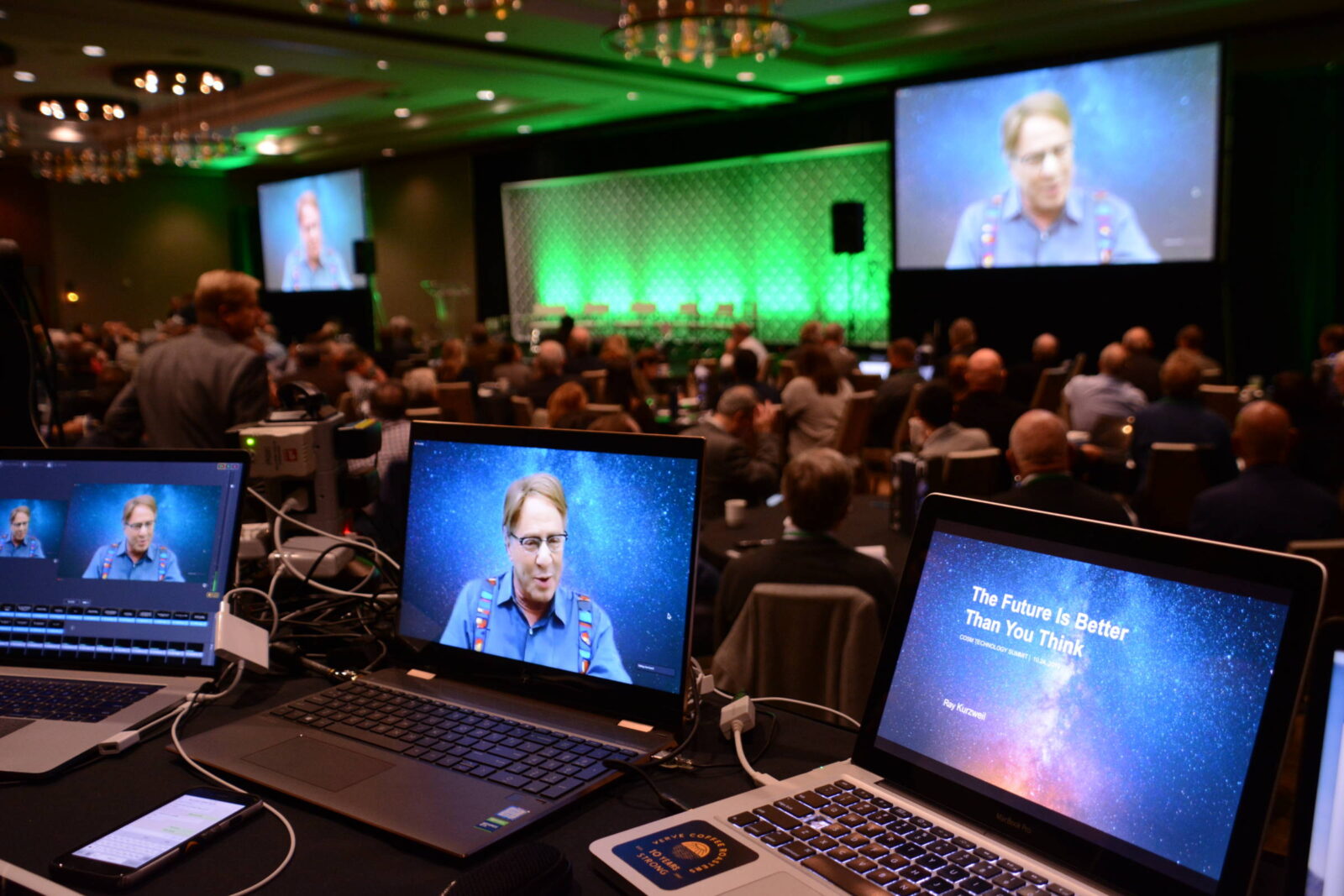At the COSM Technology Summit, tech pioneer and visionary Ray Kurzweil offered by interactive video a glimpse of his foreseen Singularity in which we merge with super-intelligent computers. As a Director of Engineering at Google, with a 30-year track record of accurate predictions and many key patents to his credit, the “the restless genius” (Wall Street Journal) projects the revolution — of which he has been so large a component — into a limitless future: “I’ve been in this field 55 years and it’s only in the last few years that we can take everything humans do and go way beyond the best human. We can perform any kind of human capability.”
He cites an example: “AlphaGoZero was not given any information about Go but after three days defeated every human. These milestones are coming quickly.”
“Given a pattern they are showing that they can do everything. Every human skill falls into these categories.”
“Even the very best human is just another notch to pass.”
And he is not afraid to put dates on his predictions.
Common sense knowledge in computers, he told the audience, will be solved by 2029. The Turing test will be passed by 2029 (30% of AI experts agree) “Once we pass the Turing Test, we will have capability way beyond that of humans.”

But now mark what follows: In the 2030s, he explained, we will connect the top layer of our neocortex to the last layer of the cloud (as in cloud computing) to connect our biological intelligence to non-biological intelligence. “Our intelligence will then be a combination of our biological and non-biological intelligence.” The Singularity. We will become apps of our smart computers.
He introduced his most recent book, Danielle: Chronicles of a Superheroine to his audience, a work of fiction intended to present his ideas “to everyone, both young and old”: “She takes action and changes the world for the better.” Accompanied by two non-fiction books (“a first in publishing”), it instructs us all in how we might do the same thing, according to his vision.
In response, conference host George Gilder asked: “How far are we from collecting everything that is in your brain?”
Kurzweil explained, “To do that, we need to go inside your brain. When we get to the 2030s, we will be able to do that. So a lot of our thinking will be inside the cloud. In another ten years, our non-biological thinking will be much better than our biological thinking.” In 2017, he predicted 2045 for a total merger between man and machine.
These are heady prospects. If they are unsettling, so is much of the background. For example, speaking of his late father, Kurzweil told his audience, “I collected everything my father has written.” He then turned it into a file for Google’s Talk to Books, a program he helped develop. The user asks questions and material from books is generated as answers. Kurzweil found the selections from his father’s recorded writings “maybe more compelling than when he was alive.” He is likewise collecting his own works, “so I can talk to myself as well.” He adds, “Google and many other companies are making progress in understanding every aspect of human beings.”
One thing he doesn’t appear to understand is that communication with a dead author is not a two-way street. If we misunderstand, the mute deceased are not there for us and cannot correct us. Nor can there be any evolution of their thinking in this world ever again. What we have of them is a record, not a life. Does this amount to a slight difference in theinterpretation of a human life—or a chasm?
Kurzweil is also known for taking huge numbers of supplements daily. He acknowledged in response to a questioner that he has reduced the number he takes from 200 a day to 100. “A lot of people are working on extending life,” he explained.
He didn’t directly discuss transhumanism, the quest for immortality that underlies his passion for supplements. The basic idea is to survive long enough to gradually merge with the computers, as he told PBS in 2012: “Information defines your personality, your memories, your skills. And it really is information. And we ultimately will be able to capture that and actually recreate it. So then we will back ourselves up. People a hundred years from now will think it pretty amazing. People actually went through the day without backing up their mind file?”
Other questions surface: Immortality is a dream of the ages. Can mere technology create it in a universe governed by entropy? And what would the point of life as a software program be? A current proposal requires that the AI uploader kill the aspirant to immortality—but then he could attend his own funeral as an AI entity, assuming that’s a consolation.
Advocates point to the success of Kurzweil’s past predictions as evidence that his Singularity is indeed Near, as his 2005 book predicts or Nearer, as his forthcoming one (June 2020) does.
But fortune favors heady predictions issued on the upswing of a historic trend. On the downswing, equally convincing predictions fail. Put another way, Big Tech could be spinning its wheels but we might not know that from industry reports.
Kurzweil’s approach contrasts sharply with that of Wall Street Journal columnist Andy Kessler, who had told the COSM gathering earlier that all Big Tech enterprises contain within themselves the seeds of their own destruction. That prompts the question, will the dread seed sprout for Big Tech in general before Kurzweil’s Singularity is reached?
Are there limits, in any event, to what calculating machines can do? The panel following his talk, “AI’s Role in Unlocking Human Potential,” seemed to think so.


